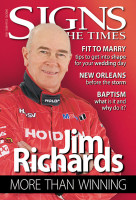A decade ago, Glenis Lindley visited New Orleans as a tourist. What she experienced was in complete contrast to the drama being played out there today
In less than five years, we've lived through the horrors of New York's September 11, 2001, terrorist attack, Iraq's distressing war, the terrifying tsunami that engulfed many, and the recent tragic loss of lives when London's transport system was assaulted by yet another terrorist group. And when Hurricane Katrina began its advance on New Orleans from the Gulf of Mexico at the end of August, we were prepared to take it in our stride—until, that is, the enormity of the devastation and its human impact were realised.
Those further removed from the immediate scene watched in bewilderment as a whole sophisticated and prosperous city and surrounding area (the size of Victoria) was submerged by floodwaters. What began as a storm of intense magnitude, that could nevertheless have been ridden out with good preparation, was multiplied into a human tragedy unrivalled in United States history.
According to analysts, losses are likely to make it the costliest natural disaster ever, with a figure around $US100 billion being suggested. No price can be put on the human loss. The death toll couldn't be accurately established for weeks, even after floodwaters subsided. The human suffering and struggle of stunned survivors (around 1.3 million) will never be accurately accessed.
Who ever imagined a whole city engulfed in such a way? Who ever evacuated a metropolis the size of New Orleans? Such an event was inconceivable, so no wonder some residents refused to leave their stricken homes. Then, having survived the force of the category-four hurricane, in which very few were killed, the real horror began. As the levees broke and the city began to submerge, lawlessness emerged. Looting, shooting and murder, suicide, rape and robbery became part of the pitiful existence of terrified people awaiting a belated evacuation.
Most survivors took no part in this. Rather, ordinary citizens banded together helping one another—brothers and sisters in adversity—in stark contrast to the worst behaviour from others—the gangs and criminals—who displayed their total disdain for the lives or situations of everyone else.
According to reports, even the police feared for their lives, many abandoning their posts, leaving a handful to protect the homeless and helpless. One was Melbourne-born, former Gold Coast resident Officer James Gourlie, who shifted to New Orleans after marrying an American. Gourlie, 30, was overwhelmed by people in need. Motivated by his sense of duty and Australian belief that “running away ain't the Anzac way,” stayed. “You sacrifice yourself for your mates,” he said.
With recovery, came the celebrities. Civil rights campaigner Jesse Jackson objected to the use of the term “refugees,” as applied to people forced to evacuate their homes leaving behind possessions, jobs and their dignity. He also reacted to biased statements in the media, which applied vastly different labels to blacks and whites scavenging for the means of survival in flooded, abandoned stores.
Along with George Bush, many prominent people have offered opinions on the disaster, its aftermath and relief operation, among them US Secretary of State Condoleezza Rice and Senator Hillary Clinton, various singers and actors, and an Al Qauda spokesperson in Iraq, who crowed that “the wrath of the all-powerful fell upon the nation of oppressors. Their dead are in the thousands and their losses are in the billions.”
Me? I watched the horror unfold daily from the comfort of my lounge room, transfixed to the unimaginable images on TV. As I did, I recalled my time in the then vibrant, carefree and colourful city as a tourist in 1993—the cuisine, the French Quarter, the musicians pouring out their Blues and Gospel music, the historic plantation mansions, and the cooking class I took, learning how to cook Louisiana Gumbo, a spicy, thick soup.
I also recalled the time, with my husband, that I went to church there, wishing to experience worship of a different kind. I inquired of the hotel concierge as where to find a “black, gospel church.” Perhaps it was our foreign accents, but he tried repeatedly to direct us to his Catholic church, not the sort of thing we had in mind, so, politely, we insisted we wanted to experience the gospel singing and music of the South. A taxi took us to a Baptist church, despite warnings that it wasn't in a “good” area.
As we stepped out of the taxi, we were welcomed by a group of immaculately dressed, smiling people who asked, “Where y' all from?” and, “How can we help y' all?”
Our white skins and Aussie accents conveyed our answers, and we were directed to a “big” Baptist church where we would hear the sort of thing we were seeking. As this church was on the other side of the city, one of the congregation generously offered to drive us. Many kilometres later we arrived at an enormous, ultramodern church, where once again we were welcomed. Inside were more than 2000 churchgoers, all African-Americans. We were the only white faces and the only ones casually dressed, being in our tourist best. Embarrassed, we looked and felt just so out of place.
Despite our discomfort, we were shown to our seats. But there were no stares, no whisperings or indiscreet pointing, just sincere handshakes, smiles and genuinely warm greetings. We experienced an outpouring of Christian fellowship unlike any I'd ever experienced during the inspirational service that followed. It was about active participation—hand-clapping, enthusiastic “Amens” and interjection of praises. By the time the worship concluded, much of our self-consciousness and unease had dissipated.
After the service, many well-dressed, dignified men and women chatted to us as if we were part of their family. We were transported back to our hotel aboard the choir bus, again kilometres out of the way. That day we total strangers were the grateful recipients of heart-warming friendship, generosity and largesse, something that we're now in a position to reciprocate.




